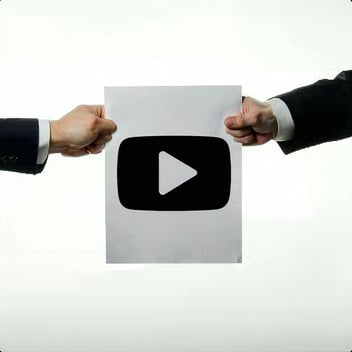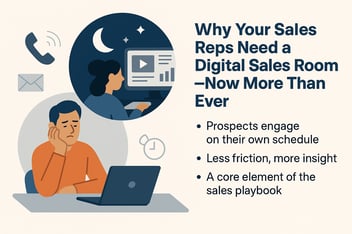
Why Traditional B2B Sales Doesn’t Work in 2025 (And What To Do Instead)
Imagine you're searching for a new software solution for your business. What’s your first move? Most likely, you’d head to Google, browse a few vendor websites, read reviews, maybe watch a demo—all without ever talking to a salesperson.
Your buyers are doing the exact same thing.
In 2025, B2B buyers are digital-first, self-directed, and highly informed. They expect a seamless experience, just like they get in their personal lives. And yet, many sales teams are still following a traditional playbook built for a world where sellers controlled the process.
That disconnect is costing companies in a big way—missed opportunities, longer sales cycles, and rising customer acquisition costs.
In this post, we’ll break down:
-
How modern B2B buyers have changed
-
Why traditional sales methods are falling short
-
What your team can do to realign and win more deals in 2025
Meet the 2025 Buyer: Digital, Independent, and In Control
The biggest shift in B2B over the last decade? The buyer now leads the dance.
Millennials and Gen Zers now make up the majority of B2B decision-makers. They’re digitally native, research-driven, and don’t want to be “sold to.” According to a 2024 Gartner study:
-
82% of B2B buyers prefer a self-service experience
-
Buyers complete 75% of their journey before engaging Sales
-
Most revisit buying stages multiple times before making a decision
This means buyers are forming opinions, comparing options, and shortlisting vendors without ever contacting your team. If you're not providing an experience that supports this journey, you risk being left out entirely.
The Problem With Traditional Sales Approaches
Despite this buyer evolution, many companies are still using the same old sales processes:
-
Step 1: Discovery
-
Step 2: Demo
-
Step 3: Proposal
-
Step 4: Close
This linear approach doesn’t match how buyers actually behave today. As a result, sales teams struggle with:
-
Limited access to buyers early on
-
Deals stalling for no clear reason
-
Inaccurate forecasts
-
Longer-than-expected sales cycles
-
Missed quotas
These aren’t just workflow issues—they’re growth blockers. But they’re also signs of an opportunity: a chance to modernize.
Realigning Sales With the Way Buyers Buy
To meet buyers where they are, your sales motion needs to feel less like a funnel and more like a flexible, digital experience.
Here’s what that looks like:
-
On-demand access to product content (think video demos, case studies, PDFs)
-
Personalized information based on role or industry
-
Collaboration features so buyers can share content with stakeholders
-
Easy ways to engage Sales when the buyer is ready
Platforms like Omedym are helping B2B companies offer just that—a self-serve buyer portal where prospects can explore, learn, and move forward at their own pace.
The Data Advantage: Smarter Sales Through Buyer Signals
With digital buyer journeys comes a powerful benefit: data.
When buyers interact with your content through a digital portal, you get real-time insights like:
-
What videos they watched (and for how long)
-
What keywords they searched
-
What documents they opened
-
What questions they asked
This behavioral data helps sales reps respond with precision. Instead of guessing, they can:
-
Tailor follow-ups based on actual buyer interests
-
Add deeper content to keep the deal moving
-
Know exactly when to engage and what to say
It’s like having x-ray vision into the buyer’s intent—and it makes for shorter, more effective sales cycles.
Ready to Sell the Way Buyers Want to Buy?
If your team has felt the strain of longer cycles or unpredictable outcomes, here’s the truth:
It’s not your team. It’s not your product. It’s your process.
Today’s B2B buyers are already halfway to a decision before they talk to you. The key is to give them a way to explore and engage on their own terms—and to meet them with context when they’re ready.
With tools like Omedym, you can modernize your sales process without overhauling your entire organization. The result?
-
More closed deals
-
Lower acquisition costs
-
Better buyer experiences
2025 is the year to stop chasing buyers—and start empowering them.
Read On
%20(2).png?width=352&name=Copy%20of%20HRZNTL%20DATABRICKS%20ads%20(1200%20%C3%97%20628%20px)%20(2).png)
9 Reasons Why B2B Sales & Revenue Teams Should Use Digital Sales Rooms
9 Reasons Why B2B Sales & Revenue Teams Should Use Digital Sales Rooms
Today, more and more B2B...

The Silent Seller: Why Digital Sales Rooms Are Now Essential in B2B Sales
Why Your Sales Reps Need a Digital Sales Room—Now More Than Ever
In today’s B2B environment, sales...

